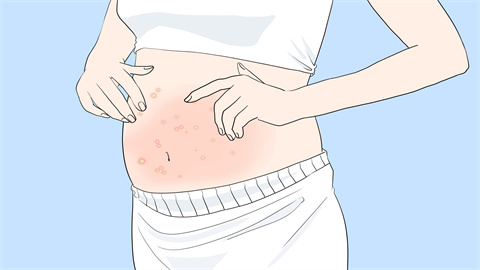Passing gas frequently and with a strong odor during the late stages of pregnancy
Experiencing frequent and particularly foul-smelling flatulence during the late stages of pregnancy may be caused by hormonal changes, improper diet, functional dyspepsia, intestinal flora imbalance, or acute gastroenteritis. Symptoms can be improved through dietary adjustments, physical activity, and medication. Seek medical attention promptly if accompanied by abdominal pain, diarrhea, or blood in the stool.
1. Hormonal Changes: Elevated progesterone levels during pregnancy inhibit gastrointestinal motility, causing food to remain longer in the gut and ferment, producing odorous gas and increasing flatulence. It is recommended to take a 15–20 minute walk after meals to promote gastrointestinal movement and avoid prolonged sitting.
2. Improper Diet: Consuming excessive amounts of gas-producing foods such as beans and onions, or high-fat foods that are difficult to digest, can lead to fermentation and foul-smelling gas. Reduce intake of gas-producing and high-fat foods, increase consumption of fiber-rich fruits and vegetables, and adopt a pattern of eating smaller meals more frequently.

3. Functional Dyspepsia: Gastrointestinal function weakens in late pregnancy, leading to slower digestion. Food stagnates in the intestines and ferments, producing gas and causing bloating and belching. Under medical guidance, medications such as lactase tablets, multienzyme tablets, or compound digestive enzyme capsules may be used to relieve symptoms.
4. Intestinal Flora Imbalance: Changes in immunity or unbalanced diet during pregnancy can disrupt intestinal flora, allowing harmful bacteria to proliferate and produce foul-smelling gas, often accompanied by irregular bowel movements. Under medical supervision, probiotics such as Bifidobacterium quadruple live bacteria tablets, Bacillus subtilis bivalent live bacteria granules, or Licheniformis bacillus live bacteria capsules may help restore balance and alleviate symptoms.
5. Acute Gastroenteritis: Consumption of contaminated food can lead to bacterial infection and inflammation of the intestines, resulting in disordered gastrointestinal motility and increased gas production, often accompanied by abdominal pain and diarrhea. Follow medical advice for treatment with medications such as montmorillonite powder, oral rehydration salts III, or lactic acid bacteria tablets to manage symptoms.
For daily care, maintain a light and hygienic diet, engage in mild physical activity after meals, drink plenty of water to support metabolism, keep the abdomen warm to prevent chilling, and attend regular prenatal checkups to monitor health status.




